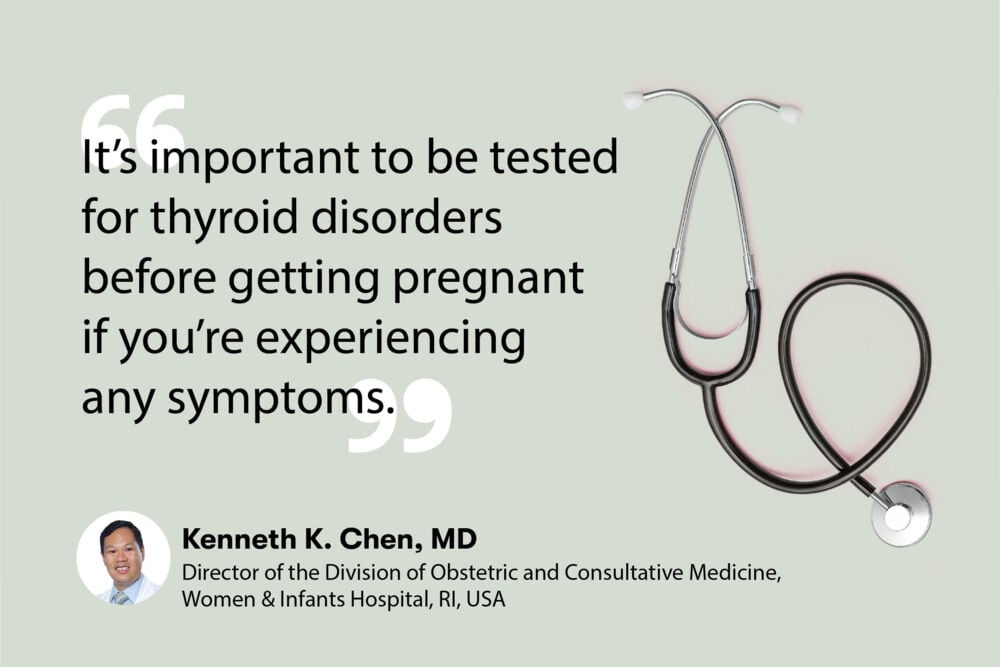Thyroid hormones during pregnancy are crucial for normal development of the baby. Endocrinology expert Dr. Kenneth K. Chen tells Flo about the most common thyroid disorders and how they can affect pregnancy.
-
Tracking cycle
-
Getting pregnant
-
Pregnancy
-
Help Center
-
Flo for Partners
-
Anonymous Mode
-
Flo app reviews
-
Flo Premium New
-
Secret Chats New
-
Symptom Checker New
-
Your cycle
-
Health 360°
-
Getting pregnant
-
Pregnancy
-
Being a mom
-
LGBTQ+
-
Quizzes
-
Ovulation calculator
-
hCG calculator
-
Pregnancy test calculator
-
Menstrual cycle calculator
-
Period calculator
-
Implantation calculator
-
Pregnancy weeks to months calculator
-
Pregnancy due date calculator
-
IVF and FET due date calculator
-
Due date calculator by ultrasound
-
Medical Affairs
-
Science & Research
-
Pass It On Project New
-
Privacy Portal
-
Press Center
-
Flo Accuracy
-
Careers
-
Contact Us
Thyroid Disorders and Pregnancy: An Interview with Dr. Kenneth K. Chen


Every piece of content at Flo Health adheres to the highest editorial standards for language, style, and medical accuracy. To learn what we do to deliver the best health and lifestyle insights to you, check out our content review principles.
Interview has been edited for clarity.
Common thyroid disorders in pregnancy
Some thyroid disorders are diagnosed for the first time during pregnancy; others are preexisting. Here, Dr. Chen describes the most common thyroid disorders in pregnancy.
Hypothyroidism (underactive thyroid)
Hypothyroidism is quite common, says Dr. Chen. In fact, it occurs in up to 10 percent of the female population. The most common cause is Hashimoto’s thyroiditis, which is a low-grade autoimmune condition that is usually hereditary. This chronic low-grade inflammation can gradually damage the thyroid gland, which leads to hypothyroidism, meaning the person has an underactive (hypo) thyroid. The symptoms are typically tiredness, unexplained weight gain, and/or cold intolerance.
“Typically, people can have this condition for quite some time, but it will not get diagnosed unless they develop symptoms that are severe enough to warrant testing,” Dr. Chen explains.
Often, hypothyroidism is picked up for the first time during pregnancy. OB-GYNs frequently check their patients’ levels of thyroid-stimulating hormone as part of the prenatal panel. If it’s higher than expected, the health care provider may diagnose hypothyroidism. The treatment for hypothyroidism is levothyroxine supplements. The health care provider may also order regular blood tests throughout pregnancy to make sure the dosage of levothyroxine supplements is correct.
Hyperthyroidism (overactive thyroid)
Like hypothyroidism, hyperthyroidism may be preexisting or diagnosed for the first time during pregnancy. The symptoms are typically irritability, heat intolerance, palpitations, tremors, and/or excessive sweating.
“The most common cause for younger women is a condition called Grave’s disease, which is an autoimmune condition,” says Dr. Chen. “The antibodies associated with this condition trigger an excessive release of thyroid hormone. The treatment for this is medication to block the production of thyroid hormone. The most commonly used are propylthiouracil and methimazole.”
If preexisting, this condition frequently gets better during pregnancy but may flare up in the postpartum period. An endocrinologist will monitor the condition very closely throughout pregnancy.
Other causes of hyperthyroidism include acute thyroiditis (for example, due to a viral illness).
Take a quiz
Find out what you can do with our Health Assistant
Thyroid cancer
Dr. Chen says that although it is not particularly common, thyroid cancer can be diagnosed during pregnancy as well.
“People who are pregnant see more doctors during pregnancy, and thyroid nodules are often detected via routine physical examination. Neck ultrasound is ordered, which would subsequently confirm their presence,” he explains.
If the ultrasound shows that the nodule looks suspicious, the health care provider will generally recommend that the patient undergo a fine needle aspiration biopsy (a procedure that involves passing a needle through the skin to sample cells or fluid). Occasionally, this procedure can be postponed until the postpartum period, as long as the patient is already toward the end of their pregnancy and agrees to come back for this test shortly after delivery.
Thyroid and pregnancy complications
According to Dr. Chen, if a thyroid condition is not well controlled, it can lead to complications for the baby.

Hypothyroidism
Severe hypothyroidism that is not recognized early can increase the risk for fetal complications, such as pregnancy loss and preeclampsia, toward the end of pregnancy. It can also hurt the fetus’s neurological development.
Dr. Chen explains, “Basically, the baby’s thyroid gland is not developed until halfway through the pregnancy, at about 20 to 21 weeks of gestation. So for the first half of the pregnancy, the baby is completely dependent on the maternal thyroid status for their own needs.”
If the mother has hypothyroidism, and this is not recognized early enough, then there is a risk that the baby’s neurocognitive development could be impaired.
Hyperthyroidism
If someone’s thyroid status is not well controlled, and they continue to have an overactive thyroid during pregnancy, this could lead to an increased risk of pregnancy loss, such as intrauterine growth retardation and preeclampsia, says Dr. Chen.
“However, the mother should be followed regularly by an endocrinologist so that the appropriate dose of antithyroid medication can be administered. An overdose of these medications could also cause the baby’s thyroid to be underactive, which would lead to neurocognitive impairment as well as fetal goiter (enlarged thyroid gland), which could cause airway issues at the time of delivery,” he says.
How to prevent complications from thyroid disorders
“It is important to be tested for these conditions before getting pregnant if you’re experiencing any symptoms,” advises Dr. Chen. “If either of these conditions are diagnosed, it is important that they be well controlled prior to conception in order to minimize any potential complications.”
If you’re already pregnant and experiencing any of the symptoms above, be sure to bring it to your OB-GYN’s attention right away. Your health care provider will check for these conditions and refer you to specialists for the appropriate treatment if necessary.
How common are thyroid disorders postpartum?
Postpartum thyroiditis usually presents between two and six months postpartum, says Dr. Chen.
He goes on, “The acute phase of this is hyperthyroidism, and once this settles (usually within two to three weeks), the person may have transient or permanent hypothyroidism. It can affect up to 1 in 10 women.”
Dr. Chen says the most common presentation is mood disorder, so thyroid function testing should be strongly considered for anyone who is experiencing the “postnatal blues.”


Hey, I'm Anique
I started using Flo app to track my period and ovulation because we wanted to have a baby.


The Flo app helped me learn about my body and spot ovulation signs during our conception journey.


I vividly
remember the day
that we switched
Flo into
Pregnancy Mode — it was
such a special
moment.
Real stories, real results
Learn how the Flo app became an amazing cheerleader for us on our conception journey.




